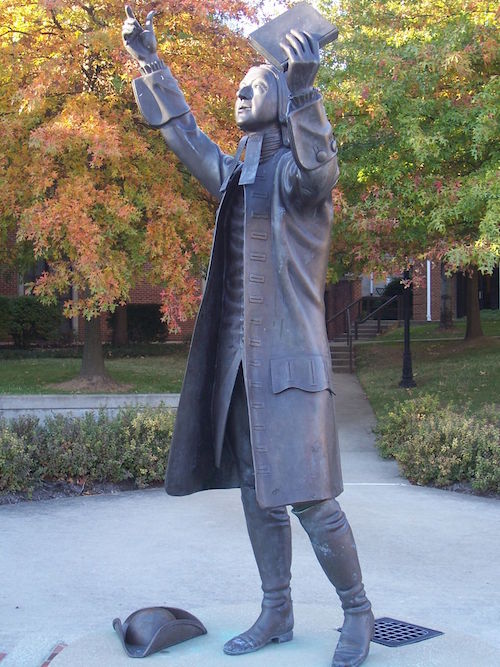 Evolution
Evolution
 Faith & Science
Faith & Science
 Intelligent Design
Intelligent Design
If John Wesley Showed Up at the United Methodist General Conference, Would They Ban Him Too?

We have spent some time reporting and analyzing on the move by the United Methodist Church to block Discovery Institute as an exhibitor at the upcoming General Conference, down the road in Portland, Oregon. Today, John West notes the irony that, when it comes to hearing fresh perspectives on evidence for design in nature, polling data shows that even atheists are more tolerant than some UMC officials.
Now over at Uncommon Descent, philosopher Vincent Torley asks a piquant question: If John Wesley, co-founder of Methodism, sought permission to set up an information table at the UMC General Conference to discuss issues of faith and science, would he be acceptable to the hierarchy of the church that traces back to him?
The answer is almost certainly no, as Torley demonstrates in a massively researched post. Look, Wesley lived centuries ago (1703-1791) so it’s not surprising that some of his specific ideas on science, education, tolerance, and the like would not be acceptable to the UMC or to us either. But from Torley’s essay, you get a clear sense of the overall spirit of the man, that leaves no doubt that if he were alive today, he would be on our side not that of the United Methodist Church.
Go read the whole thing, but in brief: Wesley closely followed scientific debates of his day and criticized proto-evolutionist views, notably those of the Comte de Buffon, both as science and as a stalking horse for atheism. He wrote a five-volume work on evidence of design in nature, A Survey of the Wisdom of God in the Creation; Or, a Compendium of Natural Philosophy. He believed that the more science revealed, the more clearly the work of a designer could be inferred (of course he identified the designer with God, which modern ID does not). He saw that evidence up and down the scale of creation, from the lowliest arthropod (he was impressed by the mite) to the great oceans to the stars in the heavens.
None of that is shocking, and obviously I don’t expect modern Methodism to adhere literally to every word written by this founder of their spiritual tradition. I’ve said much the same, as a Jew, about Maimonides — a still earlier thinker who explored science, philosophy, and theology, reaching a conclusion consonant with intelligent design. (See my essays in God and Evolution.)
Looking at it from outside, I do see in Wesley’s thought a rebuke to the censors at the UMC. He formulated his ideas based on a searching scrutiny of contemporary science. He wrestled with it, and spoke out where he saw scientific notions as being in error. He wasn’t intimidated by the prestige of those ideas. As with Maimonides, it’s the spirit rather than the specifics that count.
This is all in contrast to the obsequiousness, and the ignorance, of many religious leaders today, who are too eager to make peace with anything that goes by the name of science, and rush unthinkingly to do so. In banning intelligent design, the UMC acted, it’s clear, from ignorance of what ID is or what Discovery Institute actually advocates. See all our coverage of the ban here. In falsely associating ID with creationism, do they understand what the current debate about design in biology and cosmology is even about? It sure seems not. At the very least, John Wesley would have taken the trouble to find out and render an independent judgment.
As John West also notes, some may ask why we have devoted so much attention to the UMC if, as we say, intelligent design is a scientific theory not a religious one. The answer is that in speaking to the public about an ultimate question like this, a highly controversial one, we naturally look for appropriate allies where we can find them. The case for intelligent design doesn’t need nor does it make any reference to or otherwise draw upon religion. But any informed theism should expect confirmation from nature that life reflects a designer’s purpose. That thoughtful religious people should give a hearing to the argument for ID is, therefore, to be hoped and expected.
For that reason it’s a disappointment that the UMC hierarchy chose to shut us out. Vincent Torley points out that, following this approach, they would likely shut out their founder too if he were alive. What that says about the quality of United Methodist leaders is a question that serious men and women in the pews of that church should consider.
Image: Statue of John Wesley, Asbury Theological Seminary, Wilmore, KY, by Adam Davenport (Own work) [GFDL or CC BY-SA 4.0-3.0-2.5-2.0-1.0], via Wikimedia Commons.
